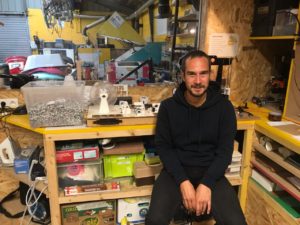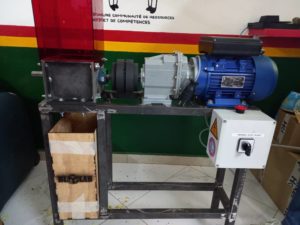The Makers Nord Sud project launched on the initiative of the Réseau Bretagne Solidaire associates the Réseau Français des Fablabs and the Réseau Francophones des Fablabs d’Afrique de l’Ouest (ReFFAO) in a double perspective:
— Component 1 consists of equipping 11 African fablabs with digital manufacturing machines and consumables to manufacture the Covid-19 protection, prevention and detection devices on site;
— Component 2 will allow the experimentation in Cotonou (Benin) of a “Precious Plastic” machine allowing the production of 3D filaments by recycling plastic waste. This experimentation will contribute to reducing the environmental impact of plastic waste in addition to making the fablabs autonomous on raw materials for 3D printing.
These open source machines allow the production of 3D filaments by recycling plastic waste to meet a growing demand for materials (electrical components) and raw materials necessary for the local manufacture of protection, prevention and disease detection devices. Economic and inclusion issues are central in these countries. Finally, this empowerment of local fablabs makes it possible to support local health systems through sustainable local production.
local health systems through inexpensive and sustainable local production of health
health devices, while supporting the global actions of African fablabs by removing the
the barrier of access to equipment.
The Precious Plastic experimentation workshop took place in Benin from 28 August to 12 September 2022. Quentin Orhant, coordinator of the common workshop, looks back on this sharing of skills with the Blolab team in Cotonou, where he trained his collaborators. Three machines were set up to manufacture 3D filaments. It is a great success!

Quentin Orhant, can you present your role in the Makers North South project?
I am the coordinator of the common workshop, an associative workshop that seeks to reduce, reuse, and recycle waste, notably with “lab” manufacturing tools such as 3D printers. We also use more traditional skills such as wood, metal and textile work.
How did you come up with the idea of manufacturing these machines in Benin?
The project is based on “Precious Plastic” machines to experiment with plastic recycling at the common workshop, on a local and citizen scale. These machines, created by Dave Hakens and documented in open source, have enabled the creation of more than a hundred plastic recycling workshops around the world. On the fablab side, we were particularly interested in the 3D printing waste that the blolab makers intuitively put aside. At first, by remelting them to create plastic plates that could be used with a laser cutter. And for the past two years, we have been experimenting with solutions to produce and manufacture 3D filaments from plastic waste.
From this initiative to create 3D filaments, we were associated with the Makers Nord Sud project after meeting Hugues Aubin, who federated and initiated the network of fablabs in Rennes. In Europe, consumables can be ordered on the internet, which is not the case in West Africa, where they are very dependent on international solidarity and development projects to obtain components (3D filaments, etc.). The aim was to come to Cotonou with the parts needed to build the machines and with Médard Agbayazon and his team from Blolab in Cotonou, we built them together, with the aim of passing them on, so that they could use them or repair them more easily. We set up three machines, based on the precious plastic plans, to manufacture 3D filaments at Blolab in Cotonou:
— An electric shredder that produces plastic chips from 3D printing waste.
— An extruder that melts ground plastic into plastic filaments.
— A winding system that cools and coils the plastic filament.

Can you go back to the workshop that took place in Benin?
The workshop was a place for exchange. I see this initiative as a gateway to think about the future. I arrived a week before the social innovation meetings that Blolab was organising for the first time. It was the ideal time to meet many digital actors and teacher-researchers. The fact of not just being in a Lab, but rather of being present at a high point of the year and in contact with the population makes a bigger impression.
I understood the whole context and the local issues. In that respect, it was a very rich experience. In the afternoon, several workshops were proposed and organised. These times of making, producing and prototyping with the participants allowed for a conversation to take place. The precious plastic workshop in which I was involved attracted a lot of attention.
I gave a general presentation on plastic and the issues surrounding this material. The aim with these machines is to raise awareness of the issue of plastics. To start at the beginning, to really think about what plastic is, why it is used, and why it is called precious plastic. These are questions that were discussed throughout the workshop to accompany this project. Everyone felt concerned by this material. These were exchanges that will remain engraved and there is still a lot to learn.
Is there a follow-up to this project?
Today, the machines are used and usable. This was the intention from the start: to go to the site with the spare parts and assemble them with the teams that have now taken over. So a small team was created. We are still in contact. The objective is to succeed in keeping this link and to continue to develop this project. This workshop has shown us all that we can work together and succeed in creating interesting exchanges, sharing and team cohesion. We hope to interest other fablabs that are concerned with the issue of plastic recycling.
The final word, it would be a matter to follow, because it is an open source project which is bound to develop. The desire to go back and find this synergy is very strong!
